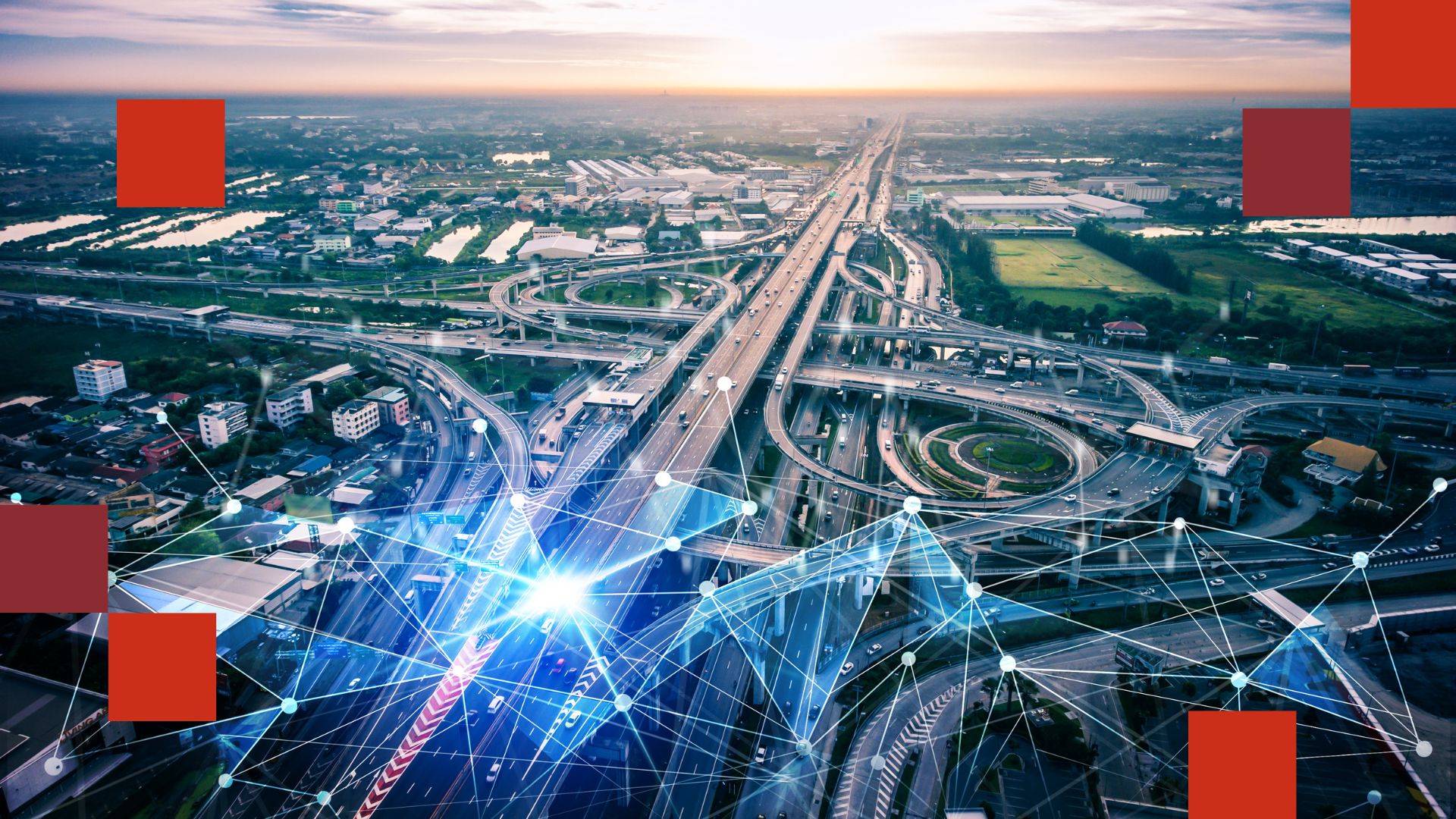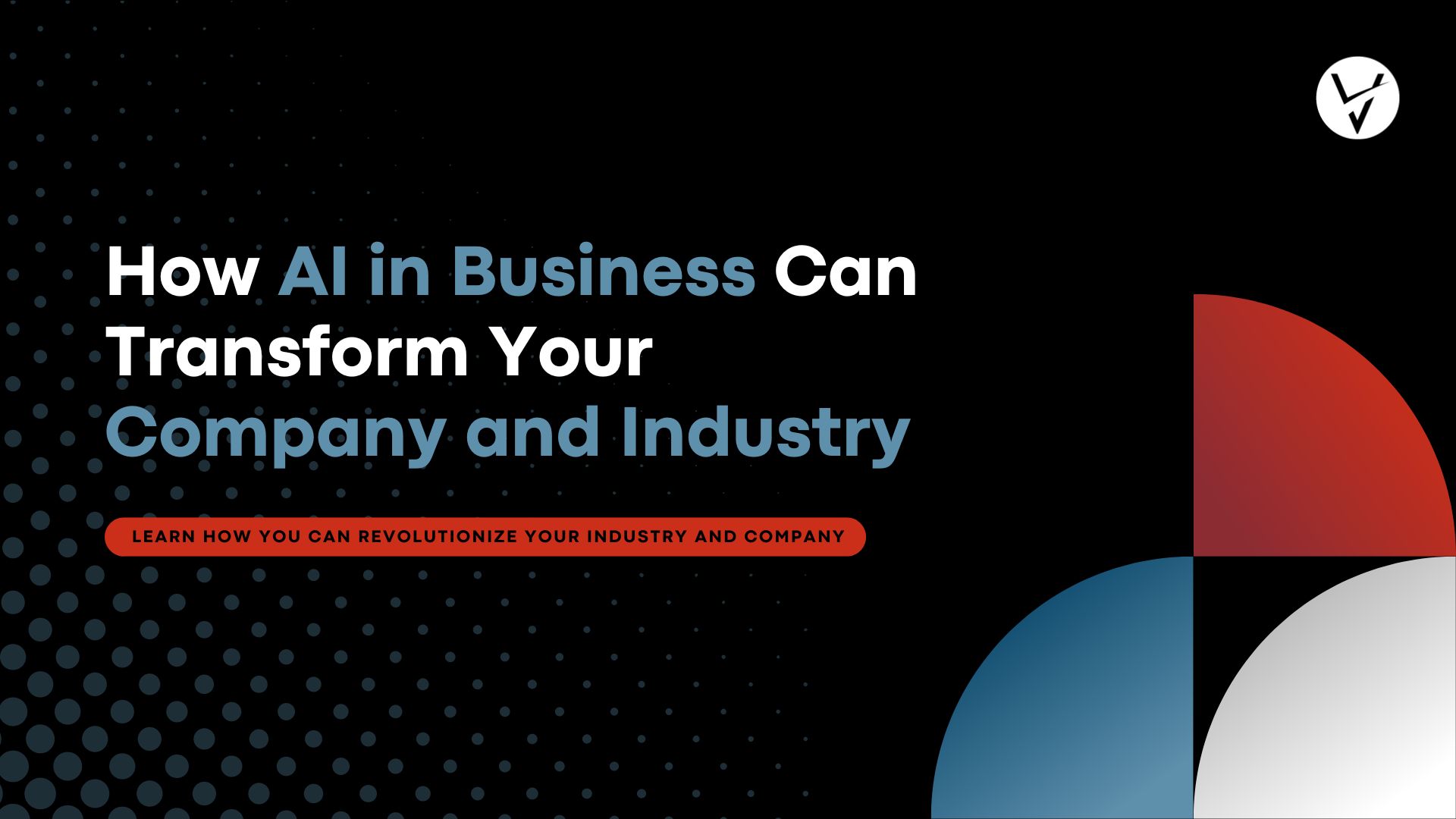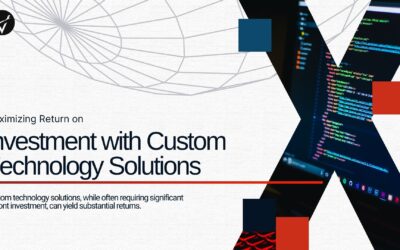As with all technology, a new revolution is sweeping industries- AI in business. AI is dominating the conversation in how to make daily operations easier, more functional, more streamlined, and overall better. However, amidst all the buzz, the question remains: how can businesses effectively leverage AI beyond basic chat prompts?
Artificial Intelligence (AI) has emerged as a game-changer, offering a myriad of solutions to improve efficiency, reduce costs, and drive innovation. By leveraging AI, businesses can stay competitive, enhance customer experiences, and unlock new opportunities for growth. AI’s ability to automate repetitive tasks and analyze vast datasets with precision allows companies to streamline operations and reduce overhead, freeing up resources for strategic initiatives.
Moreover, AI-driven insights enable businesses to better understand their customers, delivering personalized experiences that foster loyalty and satisfaction. AI also opens doors to new revenue streams by identifying emerging market trends and facilitating the development of innovative products and services. In an era where technology evolves rapidly, embracing AI positions businesses not only to keep pace with competitors. It also positions them to set industry benchmarks, ensuring sustained growth and market leadership.

AI in Business Industries
Artificial Intelligence (AI) is revolutionizing various industries, from retail and finance to manufacturing, healthcare, and transportation logistics. Across these sectors, AI is being leveraged to enhance efficiency, improve decision-making processes, and deliver personalized experiences to customers. In retail, AI-driven recommendation engines and chatbots are transforming the shopping experience, while in finance, AI is being used for fraud detection and risk management. In manufacturing, AI is optimizing production processes and quality control, while in healthcare, it’s revolutionizing diagnostic imaging and personalized treatment. Finally, in transportation and logistics, AI is optimizing supply chains, route planning, and customer service. These applications demonstrate the versatility and transformative potential of AI across different sectors, driving innovation and reshaping industries for the digital age.
Retail: Personalized Shopping Experiences and Efficient Supply Chains
In the retail industry, AI is revolutionizing the way businesses interact with customers and manage their operations. One of the primary applications of AI in retail is personalized recommendation engines. These AI-driven systems analyze customer browsing and purchase history to suggest products tailored to individual preferences, leading to increased sales and customer satisfaction. Moreover, AI-powered chatbots and virtual assistants are deployed to provide instant customer support, handling inquiries and resolving issues efficiently, thereby enhancing the overall shopping experience.
Furthermore, AI is optimizing inventory management and supply chain operations in retail. AI algorithms forecast demand fluctuations with greater accuracy, enabling retailers to maintain optimal inventory levels while minimizing excess stock. This ensures that products are always available when needed, leading to reduced inventory costs and improved operational efficiency. Additionally, AI-driven analytics provide insights into consumer trends and preferences, helping retailers make data-driven decisions about product assortment, pricing strategies, and marketing campaigns.
Finance: Fraud Detection and Risk Management
In the finance sector, AI is being used extensively for fraud detection and risk management. AI algorithms analyze vast amounts of transaction data in real-time to identify suspicious activities and patterns indicative of fraudulent behavior. By detecting fraud early, financial institutions can mitigate losses and protect their customers’ assets. Moreover, AI-powered systems enhance risk assessment and management by analyzing market trends, credit scores, and other factors to identify potential risks and opportunities. This enables financial institutions to make more informed decisions about lending, investments, and portfolio management.
Additionally, AI is streamlining customer service and support in the finance industry. Chatbots and virtual assistants powered by AI provide personalized assistance to customers, answering queries, resolving issues, and even offering financial advice. This not only improves customer satisfaction but also reduces operational costs for financial institutions. Furthermore, AI-driven predictive analytics are used for forecasting market trends and optimizing investment strategies. By analyzing historical data and identifying patterns, AI helps financial professionals make better-informed decisions about asset allocation and investment opportunities. Ultimately, this leads to higher returns for investors.
Manufacturing: Predictive Maintenance and Quality Control
In the manufacturing industry, AI is transforming operations through predictive maintenance and quality control. AI-powered predictive maintenance systems analyze sensor data from machinery and equipment to predict potential failures before they occur. By detecting anomalies and patterns indicative of impending malfunctions, manufacturers can schedule maintenance proactively, minimizing downtime and reducing maintenance costs. Additionally, AI-driven quality control systems inspect products during the manufacturing process to identify defects and deviations from specifications. This ensures that only high-quality products reach the market, leading to increased customer satisfaction and brand reputation.
Moreover, AI is optimizing production processes and supply chain management in manufacturing. AI algorithms analyze production data to identify inefficiencies and optimize workflows, leading to increased productivity and reduced waste. Furthermore, AI-powered logistics systems optimize transportation routes and schedules, ensuring timely delivery of raw materials and finished products while minimizing transportation costs. By leveraging AI, manufacturers can achieve greater operational efficiency, improve product quality, and maintain a competitive edge in the global marketplace.
Healthcare: Diagnostic Imaging and Personalized Treatment
In the healthcare industry, AI is revolutionizing patient care through diagnostic imaging and personalized treatment. AI algorithms analyze medical images such as X-rays, MRIs, and CT scans with remarkable accuracy, assisting doctors in diagnosing diseases and conditions more effectively. By detecting abnormalities and anomalies that might be overlooked by human radiologists, AI improves the accuracy and efficiency of diagnostic processes, leading to better patient outcomes. Additionally, AI-driven predictive analytics are used for patient monitoring and prognosis, enabling healthcare providers to anticipate health issues and intervene proactively.
Furthermore, AI is facilitating personalized treatment plans and precision medicine in healthcare. AI algorithms analyze patient data, including medical history, genetic information, and lifestyle factors, to develop personalized treatment regimens tailored to individual needs. This ensures that patients receive the most effective and appropriate care, leading to improved outcomes and reduced healthcare costs. Moreover, AI-powered virtual health assistants and chatbots provide patients with access to medical information, appointment scheduling, and medication reminders. This improves patient engagement and adherence to treatment plans. By leveraging AI, healthcare providers can enhance patient care, improve clinical outcomes, and advance medical research and innovation.

AI in Business and the Transportation Logistics Industry
In the transportation and logistics industry, AI is revolutionizing supply chain management and route planning, leading to increased efficiency and cost savings. AI-driven systems analyze vast amounts of data, including historical transportation data, weather forecasts, and traffic patterns, to optimize delivery routes and schedules. By considering various factors such as traffic congestion, road conditions, and delivery deadlines, AI algorithms identify the most efficient routes for transporting goods, reducing transit times and transportation costs.
Moreover, AI is enhancing inventory management and warehouse operations in transportation logistics. AI-powered systems forecast demand fluctuations and analyze inventory levels to ensure optimal stock levels are maintained. By dynamically adjusting inventory levels based on demand forecasts and market trends, transportation companies can minimize excess inventory and avoid stockouts, improving operational efficiency and reducing storage costs. Additionally, AI-driven predictive maintenance systems monitor the condition of vehicles and equipment, identifying potential issues before they occur and scheduling maintenance proactively, thereby minimizing downtime and reducing maintenance costs.
ViviScape is dedicated to changing the transport system and making it streamlined and scalable for transportation companies. Learn more about this at Cogent Logistics.

Here’s how AI in business can help transform your daily operations:
AI in Business and Automating Repetitive Tasks
One of the most significant benefits of AI is its ability to automate repetitive and mundane tasks. From data entry to inventory management, AI-powered systems can handle these activities with greater speed and accuracy than human employees. This automation frees up your workforce to focus on more strategic and creative tasks that drive business growth. For instance, AI in business can manage order processing, payroll, and customer service inquiries through chatbots, significantly reducing the workload on your team.
Additionally, AI can analyze vast amounts of data to provide insights and forecasts, enabling businesses to make data-driven decisions quickly and effectively. This enhanced efficiency not only improves productivity but also leads to more innovative solutions and a stronger competitive edge in the market.
Enhancing Customer Service with Technology
AI-driven chatbots and virtual assistants are revolutionizing customer service by providing instant, around-the-clock support for a wide range of customer queries. These tools ensure a consistent and high-quality customer experience, significantly reducing response times and handling routine inquiries efficiently. By integrating AI into your customer service operations, you can free up human agents. They can then focus on more complex and nuanced issues that require a personal touch. This not only enhances the overall efficiency of your customer service team but also leads to higher customer satisfaction and loyalty. Moreover, AI can continuously learn and improve from each interaction, leading to progressively better service and the ability to anticipate and address customer needs proactively.

Data Analysis and Insights with The Future of AI
Businesses generate vast amounts of data every day. AI in business can process and analyze this data much faster than traditional methods, providing valuable insights that can inform decision-making. AI algorithms can identify patterns and trends, predict future outcomes, and generate actionable recommendations. This capability is particularly useful in areas such as market research, sales forecasting, and customer behavior analysis. With AI, businesses can make data-driven decisions that enhance their strategic planning and operational efficiency. Additionally, AI-driven analytics can help detect anomalies and opportunities that might otherwise be overlooked, enabling businesses to respond swiftly to market changes and customer needs. By leveraging AI, companies can gain a competitive advantage, optimize their operations, and drive innovation through informed decision-making.
Personalized Marketing and Artificial Intelligence
AI enables businesses to deliver highly personalized marketing experiences. By analyzing customer data, AI can segment your audience based on various criteria such as demographics, behavior, and preferences. This allows you to tailor your marketing messages and offers to individual customers, increasing the likelihood of engagement and conversion. AI can also optimize marketing campaigns in real-time, adjusting strategies based on performance metrics to maximize ROI. Furthermore, AI-driven personalization extends beyond just email or digital ads. It can enhance the entire customer journey, from personalized product recommendations on e-commerce platforms. It can also improve dynamic content on websites. By creating a more customized and relevant experience, businesses can build stronger relationships with their customers, fostering loyalty and driving long-term growth.
Supply Chain Optimization and Machine Learning
AI in business can significantly enhance supply chain management by improving demand forecasting, inventory management, and logistics. AI algorithms can predict demand fluctuations more accurately, helping businesses maintain optimal inventory levels and reduce costs associated with overstocking or stockouts. Additionally, AI can optimize delivery routes and schedules, ensuring timely deliveries and reducing transportation costs. These improvements lead to a more efficient and responsive supply chain. Moreover, AI can provide real-time visibility into supply chain operations, allowing businesses to quickly identify and address disruptions or inefficiencies. Companies can achieve greater agility by integrating AI into supply chain management. They can also reduce waste and enhance overall operational performance. This ultimately leads to increased customer satisfaction and competitive advantage in the market

Fraud Detection and Security
AI is a powerful tool in detecting and preventing fraud. By analyzing transaction patterns and identifying anomalies, AI systems can flag potentially fraudulent activities in real-time. This proactive approach helps businesses protect their assets and maintain customer trust. Furthermore, AI enhances cybersecurity by detecting and responding to threats faster than traditional methods. With AI, businesses can safeguard their sensitive data and ensure compliance with regulatory requirements. Additionally, AI can continuously learn from new fraud patterns and cybersecurity threats, improving its detection capabilities over time. This adaptive nature allows businesses to stay ahead of increasingly sophisticated cybercriminals. Implementing AI-driven fraud detection and cybersecurity measures reduces financial losses and reputational damage. It also reinforces customer confidence in the business’s commitment to protecting their personal and financial information.
Improving Decision-Making
AI supports decision-making processes by providing accurate and timely insights. Whether it’s strategic planning, financial forecasting, or operational management, AI can offer data-driven recommendations that enhance decision quality. By leveraging AI, businesses can reduce the risk of errors, make more informed choices, and respond swiftly to changing market conditions. AI systems can process vast amounts of data at speeds far beyond human capability, uncovering hidden trends and correlations that might otherwise go unnoticed. This level of analysis allows businesses to predict future scenarios and prepare accordingly, leading to more robust and resilient strategies. Furthermore, AI can simulate various decision outcomes, helping executives to evaluate potential risks and benefits before implementing changes. By integrating AI into their decision-making frameworks, companies can achieve greater agility, precision, and confidence in their strategic initiatives.
Innovative Product Development and AI in Business
AI can drive innovation by enabling businesses to develop new products and services. For example, AI can analyze customer feedback and market trends to identify unmet needs and preferences. This information can guide the development of products that better meet customer demands. Additionally, AI can accelerate the design and testing phases of product development, reducing time-to-market and increasing the likelihood of success. By using AI to simulate various design scenarios and optimize product features, companies can create more efficient and effective products. AI can also facilitate rapid prototyping and virtual testing, identifying potential issues early in the development process and ensuring higher quality outcomes. Moreover, AI-driven insights can inspire entirely new business models and service offerings, allowing companies to stay ahead of industry trends and maintain a competitive edge. Embracing AI in product development not only enhances innovation but also fosters a culture of continuous improvement and agility within the organization.

Conclusion
Incorporating AI into your business operations can yield significant benefits, from increased efficiency and cost savings to enhanced customer experiences and competitive advantage. As AI technology continues to evolve, its potential applications will only expand, offering new ways for businesses to innovate and thrive. By embracing AI, you can position your business for long-term success in an increasingly digital world. AI in business can streamline processes, automate routine tasks, and provide deep insights into every aspect of your operations, from supply chain logistics to customer service. Moreover, as AI systems become more advanced, they will offer even greater precision and adaptability. This will allow businesses to personalize experiences, optimize resource allocation, and anticipate market shifts with unparalleled accuracy. Investing in AI today not only enhances your current capabilities. It also prepares your organization to leverage future technological advancements. This ensures you remain at the forefront of your industry.

What ViviScape Can Do for AI in Business
To learn more about how AI can help your business, reach out to us at ViviScape. We specialize in leveraging AI in business models to create custom solutions that meet your unique needs. Our team of experts will work closely with you to understand your specific challenges and goals, developing AI-driven strategies that enhance your operations and drive growth. Whether you’re looking to automate processes, gain deeper insights from your data, or create more personalized customer experiences, ViviScape has the expertise to make it happen. Contact us today to explore the possibilities and discover how AI can transform your business for the better. Let us help you stay ahead of the curve and achieve long-term success in an increasingly digital world.
Have questions about how much an AI featured software would cost? Learn more about custom software pricing in our article.




